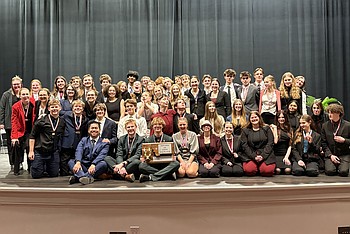Warnick’s bill extending livestock ID program passes Senate
By Elizah Lourdes Rendorio, Columbia Basin Herald Legislative Intern | Columbia Basin Herald | UPDATED 3 weeks, 6 days AGO
OLYMPIA - The Senate passed Sen. Judy Warnick’s, R- Moses Lake, bill extending the livestock identification program last week with bipartisan support. It will still need to pass the Washington House of Representatives before moving on to the governor's desk.
“Everybody needs to know and wants to know that our animals, especially our commercial animals, are being kept safe and free from disease,” said Warnick in a public hearing.
Senate Bill 5485 continues the current livestock identification fees, the Livestock Advisory Committee, and the Livestock Identification Program from July 2026 to July 2030.
According to Warnick, the extension is necessary to ensure the program can operate without interruption, offering stability to producers across the state.
The program was first established in 2019 to create a fee structure that funds the modernization of the brand inspection system to ensure asset protection. The system helps track ownership, deter theft, and aid disease traceability.
According to Brennan Kimbel, livestock identification program manager for the Washington State Department of Agriculture, the program has undergone drastic changes since the fee implementation.
“We're able to act more proactively now, make more efficiencies in the program, modernize the program—things like that,” said Kimbel.
She also mentioned that currently, they are working to help track the recent outbreak of high-path avian influenza among dairy herds through increased data collection.
“Our mission, or what we're striving to do, is collect those individual identification numbers so that we can trace where animals go if there's a disease outbreak,” said Kimbel.
She explained that despite improvements, the program is primarily funded through inspection fees. As the number of animals that receive inspections is relatively the same, revenue is limited, creating challenges in maintaining service levels.
Warnick said the program is fiscally solvent, however, Kimbel expressed concerns about rising expenditures, including staff salaries, building operations, and use of fleets that could impact their financial projections.
“Our program has to figure out how we are going to do the same service level for as little amount of money as we possibly can,” she said.
Kimbel emphasized that increasing fees for producers would be a last resort but acknowledged there is only so much the program can do to reduce costs. She said with the extension, their production budget shows the program should remain solvent through 2029.
Mark Streuli from the Washington Cattlemen’s Association emphasized the importance of keeping the program financially viable for producers.
“If we didn't remove the sunset, or if we didn't put it out for years and it went back to the old fees, the program would be out of business,” said Streuli.
He states that when the time comes to reassess the fee structure, everything will have to be on the table.
SB 5485 already received a reading in the House Agriculture and Natural Resource Committee on Feb. 27 with a public hearing yet to be determined.
MORE STORIES
Glacier High speech and debate bags a win in Corvallis
Daily Inter-Lake | Updated 2 months, 2 weeks ago
High school students qualify for international business and leadership competition
Daily Inter-Lake | Updated 1 month, 2 weeks ago


